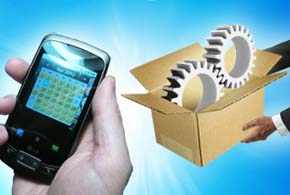A Denver-based nonprofit, Rocky Mountain Human Services (RMHS), is transforming its mobile communications and enhancing productivity by giving its 350 employees smartphones and upgrading its enterprise mobile management (EMM) system this year.
The move will benefit both the company and its 7,000-plus clients with cognitive and intellectual impairments by provisioning faster data sharing, in addition to creating quicker response times between in-the-field employees and supervisors in the office or elsewhere. With BlackBerry Enterprise Service 10 (BES10) and BlackBerry Z10 smartphones, employees will have secure email, messaging and file sharing wherever they go.
“Functionality is obviously first and foremost in everyone’s mind,” says Andrew Shattuck, senior technical support analyst at RMHS, which offers behavioral health and brain-injury support among its programming. The company had been using BES5, but the move to BES10 is a “monumental upgrade,” he adds.
The system offers the nonprofit the encryption and granular levels of security it needs to comply with Health Insurance Portability and Accountability Act (HIPAA) standards at the device, server and network levels. An email forwarded or opened on an RMHS device must have security encryption because even a client’s name is considered protected, confidential information under the health law.
BES10 enables RMHS to manage all of its mobile devices centrally and to remotely shut down any device if there’s a security concern. Plus, employees can easily obtain colleague contact information, such as a phone number for a device, by typing a name into the enterprise server.
Citrix Receiver, which allows applications, data and desktops to be accessed remotely, lets employees retrieve RMHS’ case management software files when out in the field. That’s more convenient and secure than lugging papers around or pulling out a computer to connect through a WiFi connection that may not be secure.
The Z10s may be useful in other ways, according to Shattuck, as future rounds of phones are deployed to employees. One of these is the video chat capability available with BlackBerry Messenger (BBM). A maintenance employee who sees water damage at a client’s home will be able to use this component to show the damage to a supervisor in real time instead of taking pictures and sending them to seek approval for repairs.
Shattuck hopes the Skype application on the BlackBerry 10 OS will have a positive impact in 2014 as more employees begin video conferencing in for meetings. The BB Hub is also proving popular with employees, who can check their emails, texts, notifications, tweets and other updates with one swipe gesture.









